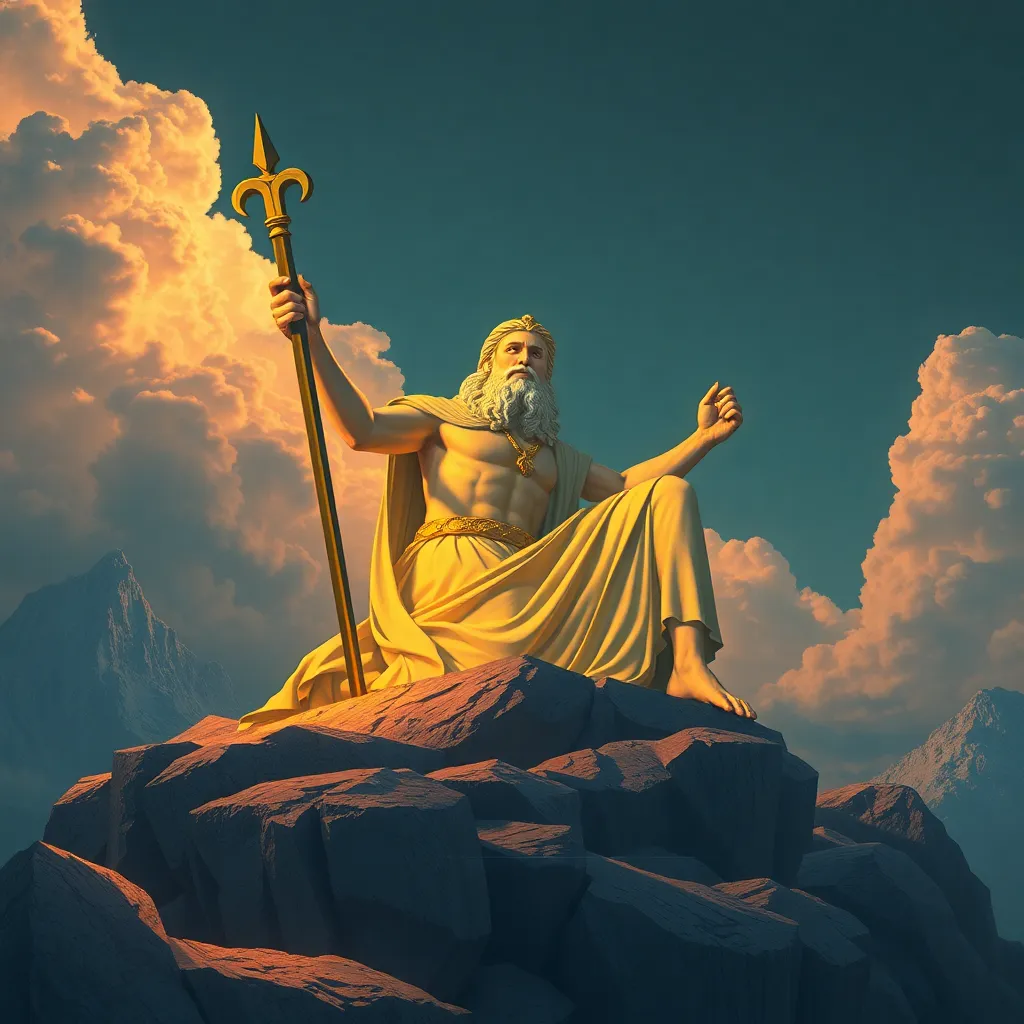The Myths of Zeus: King of the Gods on Mount Olympus
I. Introduction
Zeus, the supreme deity of ancient Greek mythology, stands as a central figure in the pantheon of gods worshipped by the Greeks. His significance transcends mere myth; he embodies the principles of order, justice, and authority. As the ruler of Mount Olympus, Zeus plays a vital role in the stories that shaped ancient Greek religion and culture. This article aims to debunk common myths surrounding Zeus while highlighting the complexities of his character.
II. The Origins of Zeus
A. Birth and Upbringing in Crete
Zeus was born to Cronus and Rhea, two Titans who ruled during the Golden Age. Fearing a prophecy that one of his children would overthrow him, Cronus swallowed each of his offspring at birth. However, Rhea, determined to save her youngest child, hid Zeus in a cave on the island of Crete. There, he was nurtured by the nymphs and fed on honey and milk.
B. The Overthrow of Cronus and the Rise to Power
As Zeus grew, he devised a plan to free his siblings. With the help of Metis, the goddess of wisdom, he tricked Cronus into regurgitating his brothers and sisters: Hestia, Hera, Demeter, Poseidon, and Hades. Together, they waged war against Cronus and the Titans in a conflict known as the Titanomachy, which ultimately led to Zeus’s ascension as the king of the gods.
III. Zeus’s Role in the Pantheon
A. Zeus as the King of the Gods
Zeus’s reign as the king of the gods established him as the ultimate authority in Greek mythology. He wielded the thunderbolt, symbolizing his power over the sky and weather. His decisions affected both gods and mortals alike, showcasing his role as a divine ruler who maintained order in the universe.
B. His Relationships with Other Deities and the Hierarchy of Mount Olympus
Zeus’s relationships with other deities were complex and often fraught with tension. He held a position of power over other Olympian gods, including:
- Hera: His sister and wife, representing marriage and family.
- Poseidon: The god of the sea, often depicted as Zeus’s brother and rival.
- Hades: The god of the underworld, who ruled the realm of the dead.
These relationships often influenced the dynamics of divine interactions and conflicts among the gods.
IV. The Myths of Zeus’s Power and Influence
A. Myths Depicting Zeus’s Control Over the Weather and Natural Elements
Zeus was revered as the god of the sky and lightning, with numerous myths illustrating his control over natural elements. He was believed to:
- Bring storms and rain to nourish the earth.
- Strike down those who defied him with thunderbolts.
- Ensure the balance of nature through his interventions.
B. The Concept of Divine Justice and Moral Authority
As the arbiter of justice, Zeus upheld moral principles and enforced divine law. Myths often depicted him as a guardian of societal values, punishing hubris and rewarding righteousness. His role as a just ruler reinforced the belief that the gods were actively involved in human affairs, maintaining a moral order in the world.
V. Misconceptions About Zeus’s Character
A. The Stereotype of Zeus as a Mere Womanizer
One of the most prevalent misconceptions about Zeus is the stereotype of him as a promiscuous deity, primarily known for his numerous affairs with goddesses and mortal women. While it is true that Zeus had many lovers, this portrayal oversimplifies his character.
B. Analysis of His Relationships with Goddesses and Mortal Women
Zeus’s relationships were often complex and nuanced. For example:
- Hera: His marriage was marked by both love and conflict, illustrating themes of jealousy and fidelity.
- Demeter: Their union produced Persephone, symbolizing the connection between life and death.
- Leda: The myth of Leda and the swan showcases themes of transformation and divine intervention.
These relationships often carried deeper meanings beyond mere infidelity, reflecting the intricacies of love, power, and consequence.
VI. Zeus in Human Affairs
A. Myths Illustrating Zeus’s Intervention in Human Lives
Zeus frequently intervened in the lives of mortals, either to assist or punish them. Notable myths include:
- The story of Prometheus, where Zeus punished him for giving fire to humanity.
- The tale of Arachne, where he transformed a boastful mortal into a spider.
- The adventures of Hercules, where Zeus guided and protected his son despite the challenges he faced.
B. The Concept of Fate Versus Free Will in Zeus’s Actions
Zeus’s interventions raise questions about fate and free will. While he exercised considerable power, many myths suggest that fate, often represented by the Moirai (Fates), ultimately governed human destinies. This duality reflects the ancient Greek understanding of the cosmos, where divine influence coexisted with predetermined fate.
VII. The Evolution of Zeus’s Image
A. Changes in the Perception of Zeus from Ancient Times to Modern Interpretations
Throughout history, Zeus’s image has evolved significantly. In ancient Greece, he was revered as a powerful and just ruler. However, in later interpretations, especially during the Renaissance and beyond, he has often been depicted as a more flawed character, embodying both noble and ignoble traits.
B. Influence on Literature, Art, and Popular Culture
Zeus’s legacy has permeated various forms of art, literature, and modern media. From classical sculptures to contemporary films, his character continues to inspire stories that explore themes of power, justice, and morality.
VIII. Conclusion
Zeus remains one of the most complex figures in Greek mythology, embodying both the ideals and flaws of divine authority. His multifaceted character invites exploration beyond stereotypes, revealing a deity who navigates love, power, and justice. As a timeless symbol of authority and moral order, Zeus’s enduring legacy continues to captivate audiences in mythology and modern storytelling.




